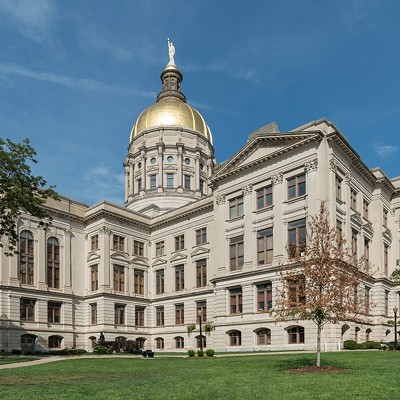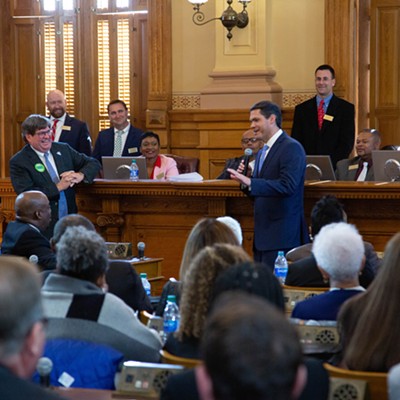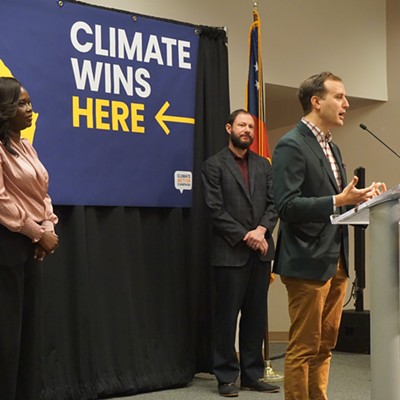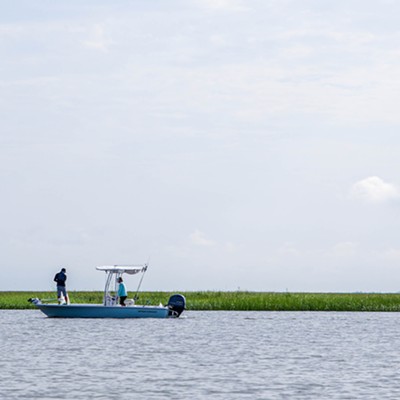The Georgia General Assembly's legislative session for 2011 came to a close on Friday, wrapping up a year when politicians who were elected on platforms of job creation managed to temporarily preserve the HOPE scholarship program and pass contentious immigration reform legislation, but couldn't get their heads around much needed tax code reform or a substantive jobs bill.
According to the Georgia Department of Labor, the state's unemployment level has been above the national average for 42 consecutive months now, and remains above 10 percent.
In honor of Earth Day, here are a few hits and misses from the Republican-dominated legislature's attempts at environmental legislation that could be headed to the Governor's desk.
Some of the bills are harder to track than others. Either because of a clerical error or a minor conspiracy, several of the Senate bills relating to changes in waste management law aren't listed, or are listed incorrectly, on the Senate Daily Composite sheet (the chart that shows when bills were voted on and whether they've advanced or not).
The section of the Georgia Code that deals with waste management in the state is Title 12 Chapter 8 Article 2, and it got quite a bit a bit of attention this year.
SB 110 - This bill would loosen restrictions on landfill use by municipalities. Previously, no waste disposal permits would be issued for facilities that accepted waste from municipalities outside of the county where the landfill was located, except in cases of regional waste disposal agreements, if any part of the site was designated as “a significant ground-water recharge area.” Basically, if part of a dump could affect local ground-water, not just anyone could dump waste there. According to the Georgia Conservancy, part of the justification for repeal was that the existing measure was unconstitutional.
HB 274 - This House Bill, co-sponsored by District 164 Representative Ron Stephens, would scratch language reading "the productivity of the soils of Georgia requires that nature's way of recycling vegetative matter be respected and followed." It would allow grass and yard trimmings to be dumped into certain landfills. Supporters say it will help generate renewable energy, but critics argue it will fill up landfills faster and increase profits for private companies.
A Senate amendment to the bill would not allow any new landfills, or the expansion of any existing facilities, within two miles of "a significant ground-water recharge area" unless it had a liner and a leachate collection system. Sounds like a good idea, except that it only affects projects that have already submitted a permit application, or who submit an application for a permit after July 1, 2016. If this makes its way to Governor's desk and is signed, it would effectively allow landfill expansion in significant groundwater sites for the next five years.
SB 157 - Modifying existing legislation regarding solid waste planning for municipalities in the state, this bill, which was co-sponsored by 1st District Senator Buddy Carter, would loosen reporting requirements for cities and counties. Local governments would be required to notify the public at least two weeks before any changes to solid waste plans, but would no longer be required to report to the state annually - the difference between "shall" and "may" in legal-ese.
Municipalities were required to report the amount of waste disposed of, the remaining permitted capacity of disposal facilities, and progress made toward waste reduction goals. The bill will also end the requirement that municipalities report the cost of waste management services to the state and the public. So much for pledges to improve transparency of government operations...
HB 225 - This bill would make it state policy to support and promote "sustainable agriculture." The term is defined by outcomes "increasing agricultural productivity and improving human health through access to safe, nutritious, affordable food and other agricultural products, while enhancing agricultural and surrounding environmental conditions through the stewardship of water, soil, air quality, biodiversity, and wildlife habitat, so as to meet the needs of the present and improve the ability for future generations to meet their own needs..." The language is added to the general provisions guiding agriculture, but doesn't provide any specifics.
SB 122 - If this bill were signed into law, it would allow local governments to enter into agreements with private developers to plan, finance and develop reservoirs, including the ability to incentive projects using federal, state or local funds that might be available.
While the bill goes to great lengths to spell out the process for hearing bids, establishing public hearings, prohibiting public employees from lobbying on behalf of development projects, and clearly stating that the bill should not be construed as giving private companies the power of eminent domain, critics argue that it does not preclude developers from misusing the bill by shopping projects to local governments in order to attract public money to fund development, rather than waiting to bid on projects that are available.



























